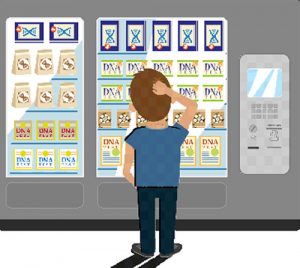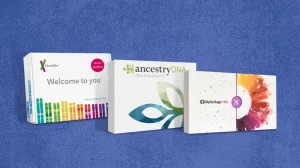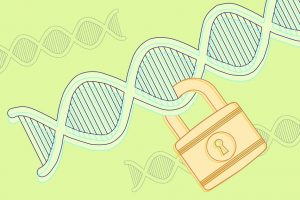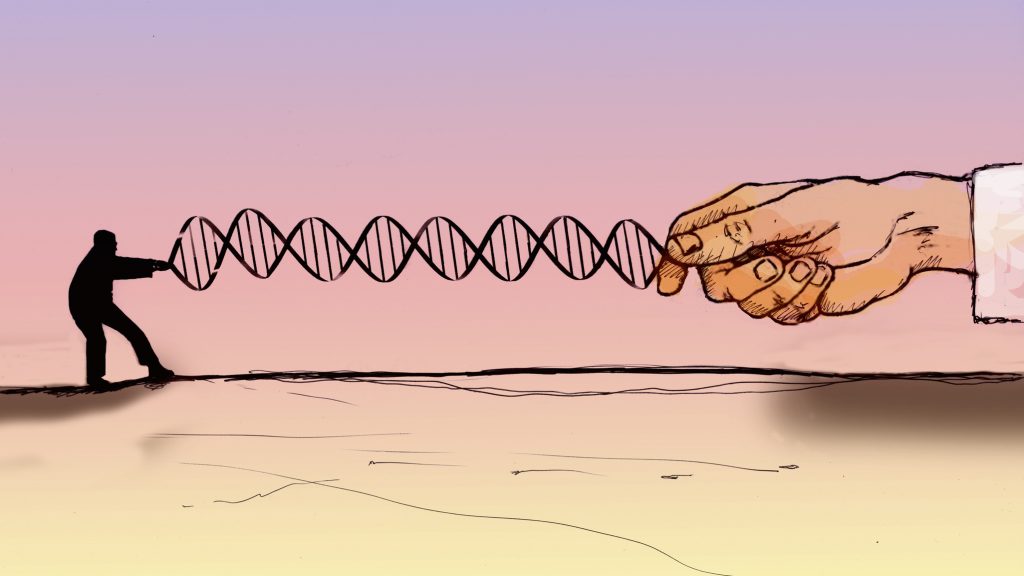Spit, Send, and Surrender: Ethical Dilemmas of DTC Genetic Testing
Direct-to-consumer (DTC) testing has attracted millions of consumers by combining convenience, affordability, and the appeal of self-discovery. For less than $100, individuals can send in a saliva sample and receive reports on their ancestry, disease predispositions, and even lifestyle recommendations. This simplicity creates an illusion of empowerment, giving consumers access to information that previously required a physician or specialist. The appeal extends beyond health: many seek connections to relatives or confirmation of family origins, especially adoptees or children of sperm donors who would otherwise lack biological context (Edge & Coop, n.d.). At the same time, marketing strategies frame these kits as essential tools for personal wellness, encouraging consumers to take action based on their genetic predispositions. As Front Line Genomics explains, the most prominent companies analyze variation through SNP genotyping, which identifies differences at fixed points in the genome rather than sequencing the whole genome (Genomics & Fletcher, 2025). SNP genotyping allows companies to provide health risk estimates and ancestry reports while keeping costs low; however, it also limits the depth and accuracy of the data. Consumers are further encouraged by stories of individuals discovering critical information, such as a predisposition to BRCA gene mutations, which might motivate them to adopt preventive healthcare.

(Courtesy of Genetic Engineering & Biotechnology News)
However, the consumer-facing market has also expanded into areas that are controversial. Phillips expresses that companies now sell genetic testing for athletic ability, matchmaking, child talent, and even infidelity, despite limited scientific validity. For example, “DNA Fit” advertises that it can test “20 key genes to help truly understand your body, and how best to train for your genetics” , while others charge up to $1,500 to predict traits such as optimism or risk-taking in children (Phillips, 2016). The products exploit parental worry and raise concerns about autonomy, consent, and fair marketing practices for minors. In 2025, the industry had expanded to include more than 136 companies offering health testing, 72 companies in nutrigenetics, and 74 in ancestry, demonstrating the widespread commercialization of the field (Phillips, 2016). Thus, while DTC testing appeals to our own curiosity, health, and identity, it simultaneously fuels questionable markets and emphasizes the ethical tension that Bernard Lonergan’s portrayal of “intentional consciousness” discusses. At the level of experience, consumers are drawn to the excitement of discovery and the promise of empowerment. Regarding understanding, they want to be able to grasp the complex science behind those promises whereas within judgement; they must think about the credibility and risks of such information. Within the community’s decision, they must face the moral choices about how their data and identity is shared. By applying Catholic Intellectual Tradition values, our principles of human dignity and moral responsibility must guide us on how we approach the new discoveries of DTC testing. This helps remind us that curiosity should never outweigh ethical duties and ensure that this progress respects privacy, honesty, and the common good.
One of the most urgent ethical concerns with DTC testing is the question of genetic data privacy. Unlike credit card numbers, DNA cannot be replaced if stolen; it is permanent, personal, and inherently identifiable. Consumers often assume that genetic information submitted to companies like 23andMe or Ancestry will remain secure, yet recent breaches prove otherwise. In 2024, 23andMe disclosed a breach that compromised nearly seven million accounts, including those of 14,000 users whose passwords were also compromised (Allyn, 2024). The company claimed that the data was anonymized; however, anonymization offers little protection when researchers have demonstrated that anyone can upload genealogical data and exploit it to reconstruct genomes (Edge & Cooper, n.d.). Techniques like IBS tiling and IBS probing allow attackers to upload falsified, poor-quality files to genealogy databases, such as GEDmatch or MyHeritage, eventually piecing together a significant portion of a target’s genome. Such open access means that even consumers who never submitted their DNA may be indirectly exposed if their relatives did, creating privacy risks that can extend to entire families. These vulnerabilities bring significant legal and ethical concerns regarding the ownership and control of genetic material. At Lonergan’s level of judgement, individuals should critically analyze whether participation within DTC testing aligns with our moral supervision to make sure our own data is protected within family and community. Company policies that authorize the transfer of genetic data during bankruptcy or mergers heighten the lack of comprehensive safeguards, as seen when Regeneron Pharmaceuticals acquired 23andMe’s genetic database in 2025 (Allyn, 2024). The American Civil Liberties Union has emphasized that companies should treat law enforcement requests with “the utmost seriousness” and resist subpoenas whenever possible, yet this still leaves open the possibility of consumer DNA being accessed for investigations without a broad public debate (Allyn, 2024). Together these realities show that consumers often surrender more than they realize when they mail in a test kit and give up their enduring control over their most personal identifier: their genetic code. In regards to CIT, this loss of autonomy challenges the concept of human dignity and provides us a question of whether technological convenience should come before the responsibility to protect ourselves and others.
Beyond accuracy, another pressing ethical concern is the reliability of DTC test results and the absence of medical overview. Unlike clinical genetic testing, which follows strict laboratory standards and involves genetic counselors, consumer kits are often less meticulous and may lead to misinterpretation of results. Studies have shown that raw genetic data from DTC companies can contain high error rates; in fact 40% of reported variants across several genes were false positives, meaning that many consumers are falsely labeled with risk factors that do not actually exist (Tandy-Conner et al., 2018). Some DTC services only test a single variant in a gene, such as those related to Parkinson’s (involving the LRRK2 and GBA genes). In contrast, clinical tests evaluate multiple variants to provide a more accurate diagnosis (Tandy-Conner et al., 2018). The limited range of DTC results is further complicated when consumers use third-party interpretation services that are not well-validated and often rely on unverified public databases, which can spread misinformation and unnecessary anxiety. For example, someone might receive a DTC report showing a “risk variant” for a serious disease, only to find out that further clinical testing confirms it is a benign variation. Without trained professionals to guide interpretation, results can start unnecessary fear or false reassurance. Moreover, Front Line Genomics emphasizes that while these tests can provide useful health predisposition ideas, they can also lack the counseling infrastructure to help consumers make informed medical decisions (Genomics & Fletcher, 2025). The absence of professional support means that consumers are left to navigate complex genetic information on their own, further increasing the risk of making harmful or misguided choices. For Lonergan’s stage of Understanding, this shows that science must be paired with ethics. The Catholic Intellectual Tradition reminds us to use knowledge responsibly and consider the effects on people. Even when disclaimers note that results should not be used for medical purposes, the marketing of these tests often blurs the line between recreational information and legitimate healthcare guidance. Consequently, the ethical concern is not simply about test accuracy but also how companies position themselves in the healthcare marketplace without offering the safeguards that medical institutions are required to provide.
Direct-to-consumer genetic testing occupies a gray area between healthcare and consumer products, creating a regulatory void that leaves significant risks unanswered. Unlike clinical laboratories, they are subject to oversight under the Clinical Laboratory Improvement Amendments (CLIA) and often guided by FDA review; most DTC companies, however, operate with minimal external accountability. As Phillips explains, many companies rely on clickwrap or browsewrap contracts that bind consumers to terms of use simply by visiting a website or purchasing a kit. These contracts often grant companies broad rights to use or sell genetic data with little attention to genuine informed consent. For example, one company’s terms stated that “by using this site…you waive any rights or claims you may have against us,” a clause that seriously undermines consumer protection (Phillips, 2016). Such practices expose the imbalance of power between corporations and individuals. Regulation is further fragmented by geography: while the Genetic Information Nondiscrimination Act (GINA) provides some protections in the United States, it only prohibits genetic discrimination in health insurance and employee benefits and fails to extend to life, disability, or long-term care insurance. (Genetic Information Nondiscrimination Act of 2008, n.d.). Additionally, HIPAA protections do not apply to DTC companies because they are not classified as healthcare providers, leaving a critical loophole (Ram et al, 2025). Internationally, the landscape is also facing this issue; the European Union has begun moving toward stricter regulation under the In Vitro Diagnostics Regulation, which may limit the availability of DTC health tests and require premarket review. However, in most markets, companies continue to self-regulate, often prioritizing their business interests over consumer welfare. For the GEM stage of judgment and decision, society should take legal and moral responsibility into account to choose conscience and justice above profit. Even the best technical protections, such as encryption, cannot prevent misuse if the legal framework permits data to be transferred in corporate mergers or sold as assets during bankruptcy, as demonstrated by 23andMe’s acquisition by Regeneron in 2025. This mixture of weak laws and company-driven contracts leaves consumers with few guarantees about how their DNA will be used, stored, or protected, increasing serious concerns about consent, autonomy, and corporate responsibility.

(Courtesy of Medical News Today)
The most controversial issue in DTC testing is the manner in which companies treat DNA as both a personal identifier and a commercial asset. When individuals mail in a saliva sample, they are not only purchasing ancestry or health insights but also contributing to massive biobanks that can be monetized. For instance, 23andMe entered a lucrative agreement with pharmaceutical giant GlaxoSmithKline (GSK) to allow access to customer data for drug discovery (Allyn, 2024). While the company insists the data is anonymized, geneticists argue that true anonymity is nearly impossible because DNA is inherently identifiable (Ram et al., 2025). The risk of reidentification grows when data is cross-referenced with other public and private sources, making consumer promises of privacy questionable. In addition, the sale of 23andMe’s assets to Regeneron in 2025, including its vast biobank of consumer genetic information, brings up debates about whether individuals actually “own” their DNA once it is shared with a company. Scholars have compared such practices to the case of Henrietta Lacks, whose cells were taken without consent in 1951 and commercialized for decades, raising enduring questions about autonomy and exploitation (Ram et al., 2025). Beyond partnerships with pharmaceutical firms, commercialization is also evident in the proliferation of niche genetic tests marketed for a wide range of applications, from predicting child talent to optimizing athletic performance, despite their unreliable scientific validity. Companies like DNA Fit promise personalized diets and training regimens based on “20 key genes”, while others charge as much as $1,500 to test for personality traits such as optimism or shyness (Phillips, 2016). These products display the tension between scientific progress and profit-driven opportunism, as the expansion into questionable markets risks threatening public trust in legitimate genetic research. In Lonergan’s view, failure to move from understanding to ethical judgement can create moral discrepancies. Reflecting upon these choices should inspire actions guided by our conscience and remind us that dignity and responsibility should outweigh profit and control. The ethical concern extends beyond privacy, but also centers on whether consumers can meaningfully contest the commodification of their most personal biological information when the legal and business structures are stacked against them.

(Courtesy of Massachusetts Institute of Technology)
Furthermore, the ethical challenges of DTC genetic testing extend beyond the individual and raise concerns regarding familial privacy, social discrimination, and collective responsibility. A huge issue is that a person’s decision to submit DNA not only reveals their own genetic information but also that of their relatives, often without their consent. This reality has enabled law enforcement to utilize genealogical databases in high-profile cases, but it also raises concerns about civil liberties and the potential misuse of genetic data (Edge & Coop, 2020). The problem is heightened by the fact that once a single family member participates, close relatives can be indirectly identified through shared haplotypes, effectively wearing down the privacy of those who never agreed to testing. On a societal level, weak legal protections also create space for discrimination. While GINA prevents employers and health insurers from using genetic information to make decisions, it does not cover life, disability, or long-term care insurance, potentially leaving consumers vulnerable to subtle forms of genetic profiling (Genetic Information Nondiscrimination Act of 2008, n.d.). The potential for misuse becomes even more troubling when viewed alongside the high error rate of DTC results: false positives can lead consumers to seek unnecessary medical care, while false negatives may provide them with misplaced reassurance (Tandy-Conner et al., 2018). Another ethical concern is the exploitation of vulnerable groups, particularly indigenous populations, through ancestry testing marketed as proof of Native American heritage or identity. As Philips states, these tests risk repeating histories of exploitation by commodifying identities that have already been subjected to marginalization. Within the GEM framework of experience, this shared exposure begins when individuals engage with genetic testing without full awareness of its bigger consequences. As understanding develops, reflection soon follows, prompting our society to judge how personal curiosity can unintentionally harm the dignity and privacy of others. The broader implications also include the psychological burden of receiving health risk information without the support of trained professionals, which can lead to anxiety, misunderstanding, or even harmful decision-making (Genomics & Fletcher, 2025). Altogether, these issues suggest that DTC testing is not just about individual choice, but also about collective consequences, where one person’s curiosity or a company’s profit motive can have far-reaching effects, affecting entire families and communities in ways that remain ethically unresolved. Through CIT, society is challenged to uphold the common good and recognize that responsibility and respect for human dignity must guide scientific advancements to impact our entire communities, not just individuals.
Direct-to-consumer genetic testing reflects the paradox of modern biotechnology because it promises empowerment but often delivers vulnerability in the process. On the one hand, consumers gain unprecedented access to their genetic information, opening doors to proactive health choices, personal identity, and participation in groundbreaking research, while also potentially exposing them to exploitation. On the other hand, this access comes at the cost of privacy, accuracy, and autonomy. The 2024 23andMe data breach exposed millions of accounts, demonstrating the fragility of consumer protections in an industry built on sensitive data. Likewise, research shows that 40% of reported variants in raw data are false positives, which clearly displays the unreliability of results without clinical verification. Legal protections, such as HIPAA and GINA, provide partial safeguards, leaving significant loopholes in areas including life insurance, disability coverage, and corporate transfers of genetic databases (Ram et al., 2025). Commercial arrangements, such as 23andMe’s deal with GlaxoSmithKline and its later acquisition by Regeneron, signify the growing commodification of DNA.
Meanwhile, niche markets for athletic ability or child talent tests reveal how profit motives can overshadow scientific validity. These realities show us ethical concerns at this moment. Who truly owns genetic information once it is shared, and what responsibility do companies, governments, and consumers bear in safeguarding it? The answer lies not in rejecting consumer genetics altogether but in demanding stronger regulations with more transparent informed consent processes, and mandatory professional counseling to help individuals interpret their results responsibly. The final stage of decision in GEM must include awareness that transforms into moral action. This urges society to protect privacy, promote honesty, and pursue justice within the field of genomics. As the final step, the Catholic Intellectual Tradition embodies the standard to uphold human dignity and the common good, reminding us true progress is attainable in science to serve humanity rather than exploit it. As Edge and Coop state, even identification makes it essential to rethink how databases are built, accessed, and governed. DTC will likely remain part of the future of personalized medicine, but its ethical sustainability depends on striking a balance between innovation and respect for individual rights. Until then, consumers who submit a sample in search of answers must recognize that they are not discovering secrets of their own DNA, but also participating in a broader experiment that tests the limits of privacy, consent, and trust in the age of genomics.
Citations



